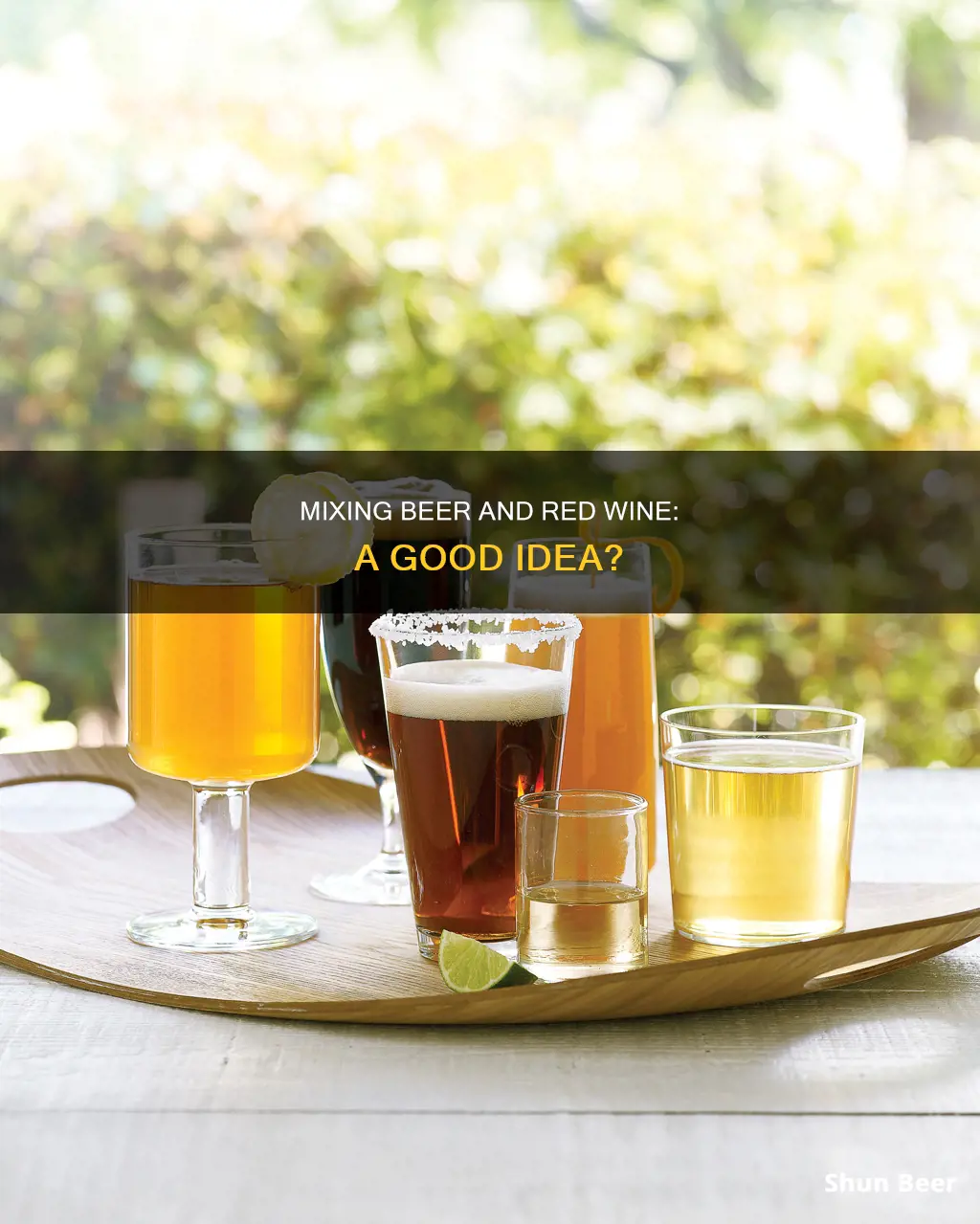
Drinking red wine and beer together is a controversial topic, with many people warning against it. However, science suggests that it is safe to consume both beverages in moderation and that the order of consumption does not matter. While folklore suggests that drinking beer before wine is safer due to its lower alcohol content, and carbonation in beer can lead to faster absorption of alcohol, recent studies have found no correlation between hangover symptoms and the order of drinking wine and beer. The best predictors of a bad hangover are how drunk one feels and whether they vomit after drinking.
| Characteristics | Values |
|---|---|
| Can you drink red wine and beer together? | Yes, but drinking too much alcohol can lead to a hangover or alcohol poisoning. |
| Is it better to drink beer before wine or wine before beer? | It doesn't matter which order you drink them in, as long as you drink in moderation. |
| Why do some people believe that the order matters? | Beer is carbonated, so it was thought that drinking beer after wine would cause faster absorption of alcohol, leading to increased inebriation and a worse hangover. |
| What are the risks of mixing beer and wine? | Mixing different types of alcohol can increase the likelihood of feeling sick. |
| How can you avoid negative consequences when mixing beer and wine? | Stay hydrated, eat properly before drinking, and avoid overdrinking. |
What You'll Learn

Beer before wine, you're fine
"Beer before wine and you'll feel fine; wine before beer and you'll feel queer" is a well-known saying that suggests drinking wine after beer will result in a worse hangover than drinking beer after wine. However, this notion has been debunked by researchers from Witten/Herdecke University in Germany and the University of Cambridge in the UK.
In their study, 90 participants aged 19-40 were divided into three groups. The first group consumed 2.5 pints of beer followed by four large glasses of wine. The second group consumed the same amount of alcohol but in reverse order. The third group, the control group, drank only wine or beer. The experiment was repeated after a week, with the first two groups swapping their drinking orders and the control group switching their drink.
The researchers found no significant differences in hangover scores among the three groups. It didn't matter whether the participants drank beer before wine or wine before beer; they reported similar hangover scores. The study concluded that drinking too much of any alcoholic beverage is likely to result in a hangover, regardless of the order in which they are consumed.
So, while the saying "beer before wine, you're fine" may be catchy and memorable, it is not scientifically accurate. The key factor in determining the severity of a hangover is the amount of alcohol consumed, not the order in which it is consumed.
That being said, it is important to note that this particular study used light-coloured beverages: lager and white wine. Previous studies have suggested that darker spirits and drinks with more congeners (natural compounds that give distinct flavours and colours) may be more likely to cause severe hangovers. Additionally, individual factors such as age, sex, body weight, and drinking habits may also influence hangover intensity.
Beer and Assisted Living: What's the Deal?
You may want to see also

Wine before beer, you're queer
There is an age-old saying that goes, "Wine before beer, you're in the clear; beer before wine, you'll feel fine." However, this saying has been debunked by science. A 2019 study at Cambridge University found that participants who consumed two and a half pints of beer followed by four large glasses of wine experienced the same severity of a hangover as those who had the drinks in the reverse order.
That being said, many people still stand by this saying, believing that the order of drinks does impact how they feel the next day. Some people suggest that drinking wine first and then beer will result in a worse hangover because the carbonation in beer speeds up the absorption of alcohol, causing the wine and beer to hit your system all at once.
Others argue that the saying is simply a cultural rhyme with no basis in reality. After all, drinking alcohol, in general, can lead to dehydration and hangovers, regardless of the order of drinks. Mixing different types of alcohol can also impair your judgment, causing you to drink more than you normally would.
Ultimately, the total amount of alcohol consumed will have a much bigger impact on how you feel than the specific order of drinks. However, it is worth noting that some people may have individual differences in how their bodies process alcohol, which could explain why some people feel worse after mixing wine and beer.
So, while the saying "wine before beer, you're in the clear" may not hold true for everyone, it is always important to drink responsibly and in moderation to avoid unpleasant hangovers and health risks associated with excessive alcohol consumption.
Beer and MRI: What You Need to Know
You may want to see also

Science says order doesn't matter
There is a popular belief that the order in which you drink alcohol does not contribute to the severity of a hangover. However, science has proven this to be a myth. A study conducted by researchers at Witten/Herdecke University in Germany and the University of Cambridge in the United Kingdom revealed that the order of drinks does not impact the likelihood or intensity of a hangover.
Ninety participants between the ages of 19 and 40 were divided into three groups for the study. The first group drank beer followed by wine, the second group drank wine followed by beer, and the third group, the control group, only consumed one type of drink. Throughout the experiment, the researchers monitored the participants' well-being and level of drunkenness. The next morning, the participants rated their hangover symptoms on the Acute Hangover Scale.
The researchers found no significant differences in hangover scores among the three groups, indicating that drinking wine and beer in either order did not affect the severity of the hangover. This finding contradicts the popular belief that drinking beer before wine will result in a milder hangover compared to drinking wine before beer.
While the order of drinks may not affect hangover symptoms, it is important to note that drinking too much alcohol, regardless of the type or order, can lead to dehydration and unpleasant hangover symptoms. Additionally, individual factors such as age, sex, body weight, and drinking habits do not seem to influence hangover intensity. However, vomiting and perceived drunkenness are two factors that are associated with more severe hangovers.
In conclusion, while the saying "beer before wine, you'll be fine; wine before beer, you'll be queer" may be catchy, it is not supported by scientific evidence. The key factor contributing to hangovers is the total amount of alcohol consumed, rather than the order in which drinks are consumed.
Mixing Milk and Beer: A Safe Drinking Combination?
You may want to see also

Folk wisdom says otherwise
Folk wisdom varies depending on where you are in the world. In the UK, the rhyme goes: "beer on wine, you'll feel fine; wine on beer, you'll feel queer". In Belgium, the saying is: "wijn na bier is plezier en bier na wijn is venijn", which means that you should drink beer first and wine after, or you will be sick. The Germans say the opposite: "Bier auf Wein, lass das sein; Wein auf Bier, das rat' ich dir", which translates to "beer after wine is to be avoided, wine after beer is advised".
There are several theories as to why drinking wine after beer might make you feel worse. One is that if you start with wine and then drink beer, the carbonation in the beer will make you absorb the alcohol from the wine more quickly and easily, leading to greater inebriation and a worse hangover. Another theory is that if you start drinking with beer, you tend to take fairly large swigs, whereas if you start with wine, you sip it. If you then switch drinks, you will continue to drink similar volumes, so a pint or two of wine will cause a bigger hangover than a wine glass or two of beer.
However, it's worth noting that these are just theories, and science has since debunked the idea that the order in which you drink beer and wine has any impact on your hangover. A study by Harvard Health Publishing found no correlation between hangover symptoms and whether subjects drank only wine, only beer, or switched between the two in either order. The best predictors of a bad hangover were how drunk the subjects felt or whether they vomited after drinking.
Beer and Gabapentin: Safe Mix or Health Risk?
You may want to see also

Congeners in wine worsen hangovers
There are many sayings about the order in which one should consume beer and wine, such as "beer before wine, you'll be fine; wine before beer, you're in the clear". However, mixing alcohol types does not cause hangovers. Instead, hangovers are caused by drinking too much and dehydration.
That being said, congeners, which are minor compounds other than ethanol that occur naturally in alcoholic beverages as a result of distilling and fermenting processes, can worsen hangovers. Dark wines and liquors have higher levels of congeners. The greatest amounts of these toxins are found in red wine and dark liquors such as bourbon, brandy, whiskey, and tequila. White wine and clear liquors such as rum, vodka, and gin have fewer congeners and therefore cause less frequent and less severe hangovers. In one study, 33% of those who drank an amount of bourbon relative to their body weight reported a severe hangover, compared to 3% of those who drank the same amount of vodka.
Congeners may worsen hangovers because the body has to break them down, competing with breaking down ethanol in the body. As a result, alcohol and its byproducts may linger for longer in the body, contributing to hangover symptoms. In addition, congeners may stimulate the body to release stress hormones, such as norepinephrine and epinephrine, which can cause inflammatory responses in the body that lead to fatigue and other hangover symptoms.
To avoid hangovers, it is recommended to drink low-congener drinks, drink on a full stomach, drink water, get plenty of sleep, and take an over-the-counter pain reliever.
UK Beer Laws: Drinking While Driving
You may want to see also
Frequently asked questions
Yes, you can drink red wine and beer together without experiencing any devastating consequences as long as you drink in moderation.
No, it does not matter if you drink beer before wine or wine before beer. Mixing the two will not make you sick, but drinking too much alcohol might.
There are several popular sayings about drinking beer and wine, including:
- "Beer on cider makes a good rider, cider on beer makes you feel queer."
- "Wine after beer/You'll feel queer;/ Beer after wine,/You'll feel fine."
- "Beer before liquor, never been sicker;/Liquor before beer, you're in the clear."
Yes, there are drinks on the market that combine beer and wine, known as hybrids. Examples include Midas Touch by Dogfish Head Brewery, Stillwater Artisanal Oude Bae, and Victoria by Allagash Brewing Co.
To avoid a hangover, it is important to drink in moderation and stay hydrated. Drinking water and eating properly before consuming alcohol can help mitigate the effects of a hangover.







